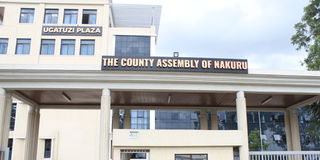Take a look at some of the changes in the persons with disabilities amendment Bill

Nakuru county assembly building.
Persons with Disabilities (PWDs) in Nakuru County are set to benefit from long-overdue support following the amendment of the Persons with Disabilities (PWD) Bill.
This follows a second amendment, fronted by Solai Ward MCA Nixon Morogo, that seeks to finally operationalize the Disability Fund established in 2015, which has remained unused for nearly a decade.
The fund, amounting to Sh 27.5 million annually, will now be equitably distributed across all 55 wards, with each ward receiving Sh 500,000 per financial year.
The Gender, Labor, Youth, and Social Welfare Committee proposed additional amendments to the bill. Led by the committee Vice Chair, Biashara Ward nominated MCA Anne Wamaitha, the bill currently awaiting the governor's assent seeks to introduce free medical assessment and care in all public health facilities.
In addition to this, it also calls for the provision of sign language interpreters to support communication, and a five per cent allocation of market space specifically for PWDs. The amendment aims to bring services and decision-making closer to the grassroots.
The process that has taken five months since April this year saw various stakeholders come together and offer their views through public participation.
"As we await the assent, we expect a mass registration of PWDs and even mobile registration for those who will not be able to get to the registration centers afterwards," she says, adding that with the full implementation of the bill, they aim to address issues related to stigma.
Wamaitha notes that decentralizing oversight and implementation would help better reflect the needs and priorities of PWDs on the ground.
The amendment also proposes a shift in governance by replacing the current Board of Directors with committees at the county, constituency, and ward levels.
These committees, Wamaitha notes, will be able to decide the usage of the funds depending on the need in each and every area.


